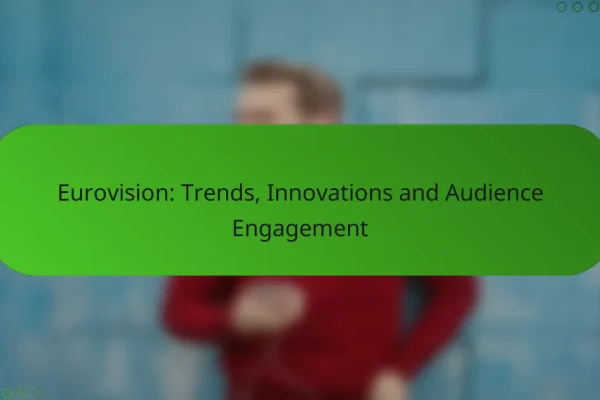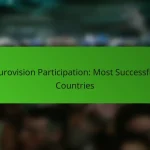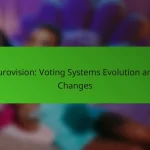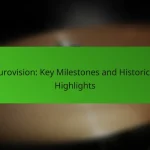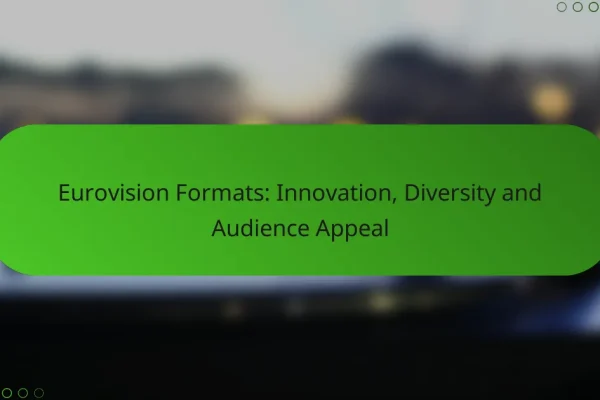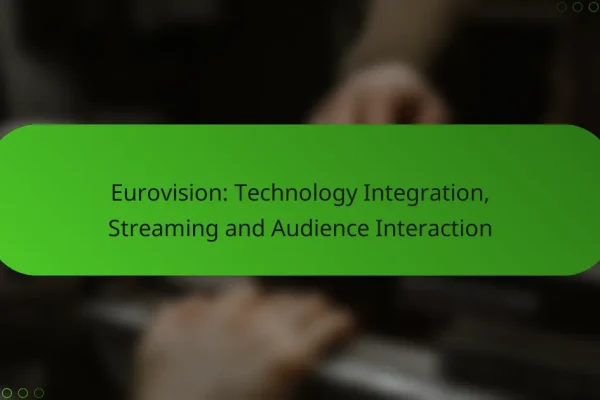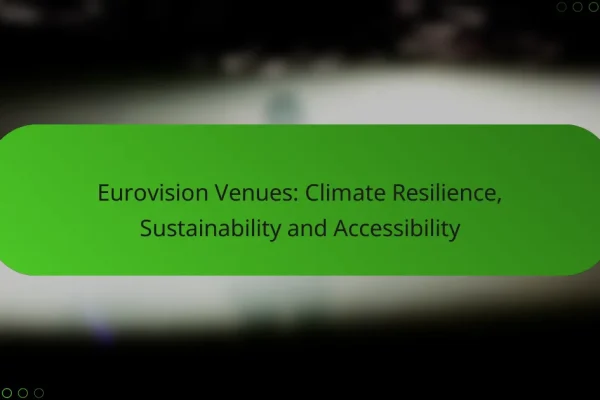What are the future trends for the Eurovision Song Contest?
The future of the Eurovision Song Contest is likely to see increased digital engagement, the adoption of emerging voting technologies, and a stronger focus on sustainability. These trends will shape how audiences interact with the event and how it adapts to contemporary values and technological advancements.
Increased digital engagement
Digital engagement is becoming a cornerstone of the Eurovision experience, allowing fans to connect with the contest beyond traditional viewing. Social media platforms and streaming services are enhancing audience participation through live chats, polls, and interactive content.
For instance, Eurovision’s official app now offers features like real-time voting and behind-the-scenes content, making it easier for viewers to engage with their favorite acts. This shift not only boosts viewership but also fosters a sense of community among fans globally.
Emerging voting technologies
The introduction of emerging voting technologies is set to revolutionize how votes are cast and counted in the Eurovision Song Contest. Innovations such as blockchain technology could enhance transparency and security, ensuring that every vote is accurately recorded.
Additionally, mobile voting apps are becoming more prevalent, allowing fans to vote instantly from their devices. This shift towards digital voting methods can increase participation, especially among younger audiences who prefer mobile engagement.
Focus on sustainability
Sustainability is increasingly becoming a priority for the Eurovision Song Contest, reflecting broader global concerns about environmental impact. Organizers are exploring ways to reduce waste and carbon footprints, such as using renewable energy sources for staging and production.
For example, initiatives like eco-friendly stage designs and sustainable merchandise are being implemented to promote environmental responsibility. By prioritizing sustainability, Eurovision not only aligns with contemporary values but also sets a positive example for other large-scale events.
How will Eurovision adapt to changing audience preferences?
Eurovision will adapt to changing audience preferences by embracing new music styles and enhancing viewer engagement through technology. These strategies aim to attract a broader demographic and maintain relevance in a rapidly evolving entertainment landscape.
Incorporation of diverse music genres
To appeal to a wider audience, Eurovision is increasingly incorporating diverse music genres, including pop, rock, hip-hop, and traditional folk styles. This variety allows participants to showcase their cultural backgrounds while resonating with different listener preferences.
For example, countries like Italy and Ukraine have successfully blended contemporary pop with traditional elements, creating unique entries that stand out. This trend not only enriches the competition but also encourages artists to experiment with their sound.
Enhanced interactive experiences
Eurovision is enhancing interactive experiences by leveraging digital platforms and social media to engage viewers in real-time. This includes features like live voting through apps and social media interactions, allowing fans to feel more connected to the event.
Additionally, virtual reality and augmented reality experiences are being explored to provide immersive viewing options. These innovations can transform how audiences participate, making them feel like part of the show rather than just passive viewers.
What innovations are expected in Eurovision production?
Future Eurovision productions are set to incorporate cutting-edge technology and creative enhancements that elevate the viewing experience. Innovations such as advanced stage technology and virtual reality experiences will play a significant role in transforming how audiences engage with the event.
Advanced stage technology
Advanced stage technology will revolutionize the way performances are presented at Eurovision. Techniques such as dynamic LED screens, automated lighting systems, and high-definition projections will create immersive environments that captivate viewers both in-person and at home.
For instance, the use of robotic cameras can provide unique angles and perspectives, enhancing the storytelling aspect of each performance. Additionally, integrating augmented reality elements can allow for interactive experiences that resonate with the audience.
Virtual reality experiences
Virtual reality (VR) experiences are expected to become a staple in future Eurovision events, allowing fans to engage with the show in unprecedented ways. Viewers can immerse themselves in the performances from the comfort of their homes, feeling as if they are part of the live audience.
Platforms may offer VR access to backstage areas, enabling fans to explore the event beyond the stage. This could include virtual meet-and-greets with artists or interactive voting experiences, enhancing overall participation and excitement surrounding the contest.
How will Eurovision influence global music trends?
Eurovision is set to significantly shape global music trends by introducing diverse sounds and styles to a wider audience. The contest serves as a platform for emerging artists and innovative collaborations, fostering a blend of cultural influences that resonate beyond Europe.
Spotlighting new artists
Eurovision acts as a launchpad for new talent, often propelling lesser-known artists into the international spotlight. Many participants have achieved global recognition after their performances, leading to increased streaming and sales. For instance, artists like Loreen and Måneskin have seen their careers skyrocket post-Eurovision, illustrating the contest’s power in promoting fresh voices.
New artists can leverage the contest’s extensive media coverage to build a fan base. Engaging with audiences through social media during the event can further enhance visibility and connection, making it essential for participants to actively promote their music before and after the competition.
Cross-cultural collaborations
Eurovision encourages cross-cultural collaborations, blending musical styles from various countries. This fusion not only enriches the performances but also introduces audiences to new genres and traditions. For example, the collaboration between artists from different nations often results in unique sounds that reflect a mix of cultural influences.
These partnerships can lead to innovative music production techniques and broaden the appeal of songs. Artists are encouraged to experiment with different languages and styles, which can resonate with diverse audiences, ultimately influencing mainstream music trends worldwide.
What are the implications of Eurovision on European unity?
The Eurovision Song Contest plays a significant role in fostering European unity by promoting collaboration and cultural understanding among participating countries. Through music and performance, it encourages nations to connect, share experiences, and celebrate diversity within a unified framework.
Promotion of cultural exchange
Eurovision serves as a platform for cultural exchange, allowing countries to showcase their unique musical styles and traditions. Each performance introduces audiences to different languages, costumes, and cultural narratives, enriching the overall experience for viewers across Europe.
This exchange fosters appreciation and respect for diverse cultures, which can lead to increased cooperation among nations. For instance, countries often collaborate on song production or share artists, enhancing cross-border relationships.
Strengthening of European identity
The contest helps to strengthen a shared European identity by uniting participants under a common event. As countries compete, they also celebrate their individuality while recognizing their place within the broader European community.
By voting for each other and engaging in friendly competition, nations reinforce their interconnectedness. This sense of unity can be seen in the way audiences rally behind their representatives, creating a collective experience that transcends national borders.
What role will social media play in future contests?
Social media will be crucial in shaping the future of the Eurovision Song Contest by enhancing viewer engagement and participation. Platforms like Twitter, Instagram, and TikTok will facilitate real-time interactions and broaden the reach of the event, making it more accessible to a global audience.
Real-time audience interaction
Real-time audience interaction allows viewers to engage with the contest as it unfolds. Fans can vote, comment, and share their thoughts instantly, creating a dynamic viewing experience. This immediacy can significantly increase viewer investment and excitement, as audiences feel their participation directly influences the outcome.
To maximize engagement, broadcasters should encourage hashtags and live polls during performances. This not only amplifies audience voices but also fosters a sense of community among fans, enhancing the overall experience of the contest.
Influencer partnerships
Influencer partnerships can amplify the reach of the Eurovision Song Contest by leveraging the popularity of social media personalities. Collaborating with influencers who resonate with target demographics can attract new viewers and create buzz around the event. These influencers can share behind-the-scenes content, promote performances, and engage their followers in discussions about the contest.
When selecting influencers, consider their audience alignment and engagement rates. Authenticity is key; influencers who genuinely appreciate the contest will create more impactful content. Brands and organizers should also be mindful of potential pitfalls, such as misalignment with the event’s values or controversies surrounding the influencers.
How will Eurovision address inclusivity and representation?
Eurovision is committed to enhancing inclusivity and representation by actively promoting participation from diverse groups and ensuring accessibility for all audiences. This approach aims to reflect the rich cultural tapestry of Europe and beyond, making the contest more welcoming and representative of its viewers.
Increased participation from underrepresented groups
To foster increased participation from underrepresented groups, Eurovision encourages entries from various cultural backgrounds, including [censured] artists and those from minority ethnic communities. This initiative not only enriches the competition but also resonates with a broader audience, showcasing a wider array of musical styles and narratives.
Countries are urged to support diverse representation in their national selections, ensuring that all voices have the opportunity to be heard. For example, nations might implement specific quotas or dedicated funding for artists from marginalized communities to help level the playing field.
Focus on accessibility for all audiences
Eurovision is enhancing accessibility by implementing features such as sign language interpretation, audio descriptions, and subtitles for viewers with disabilities. These measures ensure that everyone, regardless of their physical abilities, can enjoy the performances and engage with the event fully.
Additionally, venues are being designed or modified to accommodate individuals with mobility challenges, ensuring that all fans can attend live shows. Countries are encouraged to adopt best practices in accessibility, making the Eurovision experience inclusive for all participants and viewers alike.
